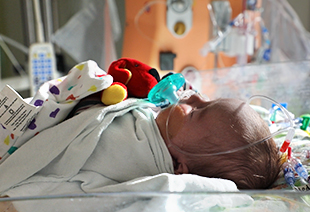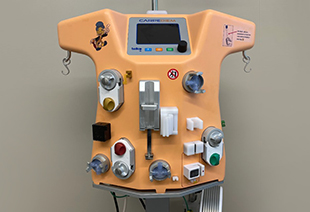New Infant CRRT Technology Offers Improved Outcomes

Cincinnati Children’s Newborn Intensive Care Unit (NICU) providers are trained and ready to use the first continuous renal replacement therapy (CRRT) machine designed specifically for infants weighing 5 to 20 pounds. Their colleagues in pediatric nephrology at Cincinnati Children’s were the first in the country to use the machine on several babies and demonstrate its effectiveness in improving outcomes for infants with failing kidneys.
Stuart Goldstein, MD, FAAP, FNKF, director of the Center for Acute Care Nephrology at Cincinnati Children’s, was a clinical consultant in developing the Cardio-Renal Pediatric Dialysis Emergency Machine (CARPEDIEM). He and his co-director, neonatologist Cara Slagle, MD, are enthusiastic about the machine’s safety profile for infants.
Slagle, who works in the NICU, says, “Infants with acute kidney injury and/or fluid overload will significantly benefit from this machine.”
The novel blood pump technology features a smaller rotor that allows for lower blood flow and less risk of blood clots than previous pumps. Scales are accurate within 1 gram per hour, and the slower blood flow helps stabilize babies.

In addition, CARPEDIEM filters are half as small as those of other CRRT machines that have larger circuit volume. Saline can be used to prime the CARPEDIEM circuit, thus avoiding blood transfusions.
Slagle notes that as preterm neonates continue to survive at earlier gestational ages, “This is the first machine that’s specifically designed for dialysis in the population I care for.”
Cincinnati Children’s has three CARPEDIEM devices, which are among the latest technologies in the 92-bed NICU opened in November 2021 in the medical center’s new critical care building.
Creating Collaboration Nationwide

Following initial successes at Cincinnati Children’s, CARPEDIEM manufacturer Medtronic has installed machines in pediatric facilities across the country.
Slagle is leading a newly formed national, multicenter, collaborative network called ICONIC (Improving CARPEDIEM Outcomes in Neonates and Infants through Collaboration) to share best practices in using the technology and overcoming treatment hurdles.
She says, “We’re starting now, before many sites receive the machine, so we can have regular discussions and assist each other with initial challenges and education, and to build a database registry to share knowledge. We not only have the opportunity to change the landscape for neonates with renal disease, but we also have the potential to collaborate with other centers to improve care across the U.S.”

